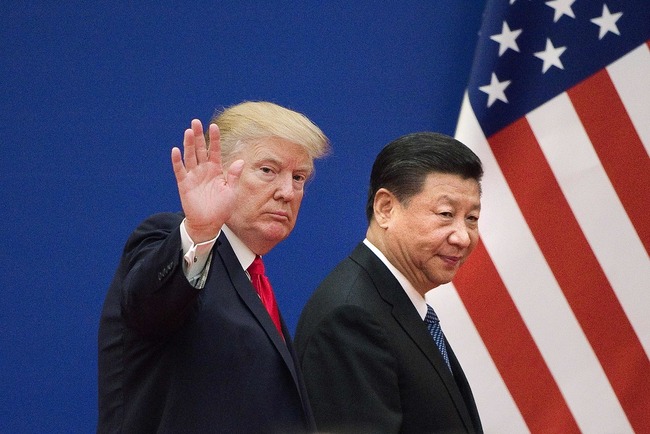 |
|
US President Trump with Chinese President Xi Jinping in Beijing in Nov. 2017. (AFP/Yonhap News)
|
Trade war unlikely to be resolved any time soon, disrupting prospects for inter-Korean summit
The primary reason given by US President Donald Trump for cancelling Secretary of State Mike Pompeo’s fourth trip to Pyongyang on Aug. 24 was the uncooperativeness of China, with which the US is currently waging a trade war. This has led some analysts to infer that Trump regards North Korea-US relations as being a “dependent variable” in the US-China trade war and in the two countries’ overarching hegemonic struggle. The trade standoff between the global strategy of the US president who has proclaimed “America First” and China’s unwillingness to submit to that strategy are likely to further complicate efforts to dismantle the Cold War structure on the Korean Peninsula, which is symbolized by the North Korea nuclear issue. While announcing the delay of Pompeo’s visit, Trump tweeted that “I feel we are not making sufficient progress with respect to the denuclearization of the Korean Peninsula” and that “because of our much tougher trading stance with China, I do not believe they are helping with the process of denuclearization as they once were.” “Secretary Pompeo looks forward to going to North Korea in the near future, most likely after our trading relationship with China is resolved,” Trump added. Some analysts believe that Trump’s position should be taken at face value, rather than being regarded as a bluff. There was one previous occasion – on May 24 – when Trump nearly upset the applecart with his abrupt cancellation of the North Korea-US summit. His demand at the time was for North Korean leader Kim Jong-un to send him a letter when he changed his mind. After North Korea relaxed its hardline stance, the summit went forward as planned on June 12. But this time around, Trump has stipulated the extremely difficult condition of “after our trading relationship with China is resolved.” China-US trade war is unlikely to be resolved in the short term But the China-US trade war is unlikely to be resolved in the short term. While the two countries held talks in Washington on Aug. 22 and 23, the talks concluded without the two sides even agreeing to hold the next round. On Aug. 26, Bloomberg predicted that, given the growing influence of hardliners like White House Director of Trade and Industrial Policy Peter Navarro and US Trade Representative Robert Lighthizer on American trade, the US would stay on the offensive in the trade war for several months to come. During a meeting with lawmakers at the White House on Aug. 23, Trump unveiled plans to do more to curb China, remarking that the US has failed to focus on China or see it properly for a long time. This essentially discloses a nearly irreconcilable gap in perspective with South Korea, which regards the most urgent strategic challenges to be resolving the North Korean nuclear issue and establishing peace on the Korean Peninsula. How “America “First” is being applied to East Asia Disregarding US allies’ traditional interests and prioritizing US economic interests is something that Trump has continued to do since his inauguration in Jan. 2017. This stance was on full display during the G7 Summit in Canada in June and the NATO summit in July. Trump declared that the joint statement emphasizing the importance of free trade that was signed by the other allies in the G7 summit was full of lies. During the NATO summit, he demanded that NATO members increase their defense spending while slamming the EU as being an enemy of the US, at least economically speaking, and Germany as being a prisoner of Russia. Trump’s imposition of the China-US trade war into North Korea-US relations shows how he is applying the principle of “America First” to East Asia, analysts say. “The US and China aren’t just waging a trade war – they’re entering the stage of a full-fledged competition for dominance of the world order. They seem to be dealing with the North Korean issue not in terms of the North Korea-US bilateral relationship but in the larger context of strategic competition between the US and China,” said Kim Heung-kyu, professor at Ajou University and director of the university’s China Policy Institute, during a telephone interview with the Hankyoreh. If the US indeed regards hegemonic competition with China as a higher priority than resolving the North Korean nuclear issue, that could make it harder to find common ground with South and North Korea, whose top priorities are resolving the North Korean nuclear issue, improving North Korea-US relations and establishing peace on the Korean Peninsula. The very fact that Trump is stringing dialogue along while keeping North Korea from carrying out any nuclear weapon or missile tests shows that he believes this won’t work against him in the midterm elections in November. On the other hand, the US is better positioned to bash China given its strong economic conditions and the high level of support at home. Trump could well have concluded that maintaining the status quo with North Korea and cranking up the assault on China may be his best choice for now, even though this would further complicate and prolong denuclearization on the Korean Peninsula. By Hwang Joon-bum, Washington correspondent






